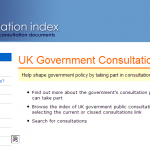Of all the topics I might have expected David Cameron to speak in favour of, standardised data formats was not top of the list. So I’m grateful to Nick Booth for pointing to Cameron’s speech last Friday to the Conservative Councillors’ Association.
At the moment, local government bodies must provide the public with information about the services they provide, what goes on in council meetings and how councillors have voted on specific issues. But the information isn’t published in a standardised way. It’s impossible for the public, charities or private companies to effectively collate this data, compare and contrast your performance and hold you to account. That’s why the Government relies on expensive and bureaucratic schemes to try and hold local government to account.
We will turn that approach on its head. We will require local authorities to publish this information – about the services they provide, council meetings and how councillors vote – online and in a standardised format. That way, it can be collected and used by the public and third party groups.
A very timely call, especially in the light of discussions last week about Harry’s consultations site (some of which, I’m told, he’s updating manually?!). I particularly like the way Cameron ties this into the tangible benefits for councillors themselves, removing the need for so many performance measurement exercises.
I’ve had some dealings in this field, particularly during my time with National Statistics. And I’m afraid it’s going to be much, much more difficult than Cameron makes it sound. Too many legacy systems, a chaotic approach to statistical geography, and (frankly) too much opposition from statisticians. Very few statisticians appreciate why they do what they do; they just do it. The work takes on an almost monastic purity. They don’t trust mere mortals – media included – to represent it properly. I was one of a management team hired to drive a culture change in that regard. Our success was limited.
Cameron’s speech focuses on TheyWorkForYou as a role model for data reprocessing; but I’m not sure the comparison holds up too well. A database of numbers would be much more difficult and more sensitive than the absolutes of Hansard: who said what (subject to correction, of course), and who voted how. Realistically we need to get to greater standardisation of process first: starting with defining consistent geographic reasons allowing sensible comparisons over time.
And besides, we haven’t done a great job of producing standardised data in RSS format, one of the most simple and straightforward data standards out there.
